
August 31, 2019
 CR Sunday Interview: Bruce Worden
CR Sunday Interview: Bruce Worden


I made a decision to formally volunteer some
CR time and resources to the non-profit behind my other gig, helping run Cartoon Crossroads Columbus (CXC). I'd like to think there was a time when people were cautious about crossing strings of involvement, but I also know how tough it is in my fifties to sort of naturally generate comics-related content of any sort, let alone carefully screened material that serves both avenues. I hope you'll forgive me, but it should mean a burst of
CR-ready material, so I'm going to jump right in.
Bruce Worden is one of the more interesting exhibiting guests with whom I work at CXC. The Michigan based cartoonist and educator seems like one of those increasingly welcome regional stalwarts: older cartoonists for whom finding an audience isn't a bridge to somewhere. I think it's rich place for comics, and links to its past where these avenue of expressions were the rule rather than the exception. I also think his endorsement of John Allison's
Bad Machinery comics says something about how these worlds of meaning are constructed now. I second that recommend, and suggest the next time you have a chunk of time to read them, to seek those comics out.
I appreciate Bruce talking to me for today, which will probably be Labor Day Weekend. In addition to the links above, he will be Table #1 at the end of month CXC Expo, the weekend anchor to the Cartoon Crossroads 4-day show. I'll be buying stuff there, and I hope you'll choose to meet him if nothing else. I very much enjoy Bruce Worden, and you should, too.
The following was edited a tiny bit for flow. -- Tom Spurgeon
*****
TOM SPURGEON: Bruce, I'm happy to talk to you because I've seen you at several show since moving to the Midwest but I don't know you very well. Do you have a standard comics-related secret origin. What your early comics reading like, and is there a story to how you returned to them as an adult?
BRUCE WORDEN: When I was a kid I wanted every comic book I laid my eyes on. So I realized early on that I couldn't afford to "get into" comic books. I thought they were cool, and I loved the characters and logos and knowing the secret identities and everything. But I knew I couldn't start collecting them, and I never did. Comic
strips, on the other hand, came to our house in the newspaper every day!
Far Side.
Calvin & Hobbes.
Garfield.
B.C.
Crankshaft.
Momma.
Tumbleweeds. I read them over breakfast nearly as far back as I can remember, and I can say without a doubt that they influenced what I've been doing with my drawings ever since. As an adult I became a scientific illustrator, using drawings to tell concise, little stories about some biological process or other, often in sequential panels. It's the same thing as comics, man. It's always been the same thing, and I couldn't be happier about it.
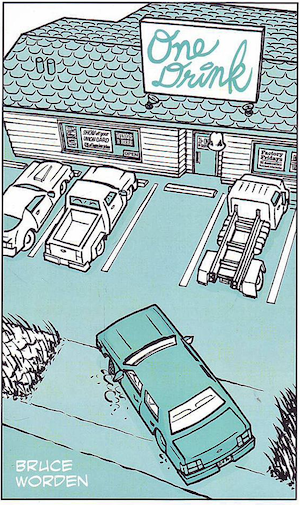 SPURGEON: I got the sense when I was running into you mid-decade that making and selling your comics was a new thing for you. How did you end up taking that step? When did comics become a creative outlet you wanted to place in people's hands?
SPURGEON: I got the sense when I was running into you mid-decade that making and selling your comics was a new thing for you. How did you end up taking that step? When did comics become a creative outlet you wanted to place in people's hands?
WORDEN: It was a perfect storm of lifestyle changes. 1 -- my part-time job left me free to pursue a freelance illustration career in my extra time. 2 -- My wife and I had a baby, which immediately put everything in perspective. 3 -- The economy tanked, and we lost a load of money. At the time, it just seemed crystal clear to me that I had to sink the freelance career. With the new baby, I wasn't going to spend my free time struggling to make other people's art for them. It was time to make
my art, to start checking projects off my list of ideas instead of only adding to it. And to do it, I was going to invest the money I would've been putting into a retirement account into those projects instead.
SPURGEON: What was it like for you as you started to build an audience? I know sometimes it gone be very strange to have these measurements by which you can tell one comic sold more than another, or people react to in different ways. What do you remember about that transition?
WORDEN: I was choosing to invest in my own future instead of some CEO's, and to make that work I had to find a way to get a return on my own investment. And I'm only realizing right now that my approach has been very much like a CEO's investment strategy: diversify. As I mentioned, I'd been working in art ever since school, so the idea of using it to make money has always been a part of my ideology. What I never did, though, was settle into a signature style. I always try -- try! -- to tailor the illustrations to suit the story. So what I ended up doing was building small audiences for each book, rather than a single audience for me-the-illustrator. Maybe not the smartest way to go, but it does make it a little easier to admit when -- and why -- one book sells better than another. It also means I show up at comic book festivals with some books that are illustrated, but aren't really comics. Oops!
SPURGEON: Were you always funny? You seemed to show up with a grounded and smartly developed sense of humor. What do you find humorous? What are some of the positives -- and maybe a negative or two -- of expressing that humor in comics form?
WORDEN: Aw, thanks! I don't know that I was always funny. I certainly used humor as a deflection, growing up a skinny nerd in a macho culture. I suppose I think I have exactly the right sense of humor for me, but sometimes it can be a little dry -- or, I don't know, dismissive? dark? -- for other people. Basically, I get the feeling sometimes people think I'm an asshole because of it. Which I guess is better than being bullied all the time. See? Deflection! [Spurgeon laughs]
Anyway, I can't stand insult humor; so even if you think I'm an asshole, you'll have to admit I'm not telling jokes at your expense. I grew up with that, having to "hold your own" against someone just mercilessly mocking you for being you, under the pretense of "Hey man, I'm only teasing." So, yeah, I guess I sought out something a little more nuanced, and I found it in the comic strips I loved best -- which meant I had to question my love of
Garfield, had to seriously question all the gender-role strips like
Andy Capp or
Born Loser. But luckily I also had
MAD Magazine, Monty Python, and Weird Al to show me how to use humor in a smarter way.

Still, as you suggest, expressing it in comics does always feel like a risk to me, because, well, what if I flub the joke? Can't go back and retell it. Gotta get the wording right, gotta get the pacing right. Carve it in stone, print a hundred copies, pray the joke lands. And pray it holds up over time, right? But I can't really imagine making comics that aren't, at their core, trying to be funny. My gut reaction to comics is to laugh.
SPURGEON: Where did the interest in homophones begin, and how did that transform into the sustained expression of the blog? In fact, how has that experience been overall? Because working something out in that specific, accessible on-line form seems like something from a time machine now a little bit.
WORDEN: You won't believe it, but it's the plan that worked out exactly as I hoped. The idea started because I can't seem to read all the way through anything anymore without finding a spelling error. And I'm not talking about tweets and texts, I mean stuff that claims to be professionally edited. Most of the time it's that someone has used the wrong word, a homophone -- words that sound alike, but are spelled differently -- for the word they intended. "Then" instead of "than." "It's" instead of "its." Affect/effect. Their/there/they're. The kind of thing that happens when a writer doesn't really pay attention, and their "editor" is just a spell-check program.
So I thought what would be more helpful than shaking my fist at the world would be to create a visual descriptor -- an illustration -- for each word to help people remember the difference. Then it could be a fun little desktop reference book. A homophone dictionary. But it was going to take a long time to do the work, and I didn't really want anyone else telling me what to draw for each pair of words. So I started it as a weekly blog -- to put myself on a schedule to get the work done, to build an audience for the book while I was still creating the content, and so the existing work -- and audience -- could speak for itself when it was time to find a publisher. Because I really, really dislike the pitching process with traditional publishers. But I knew
Homophones Visualized needed a bigger publisher than what I can do myself at Black Market Books, so I just let the blog build and build until someone -- Chronicle Books -- finally saw the value in it. It only took, what, seven years?
SPURGEON: With how much seriousness do you take that kind of wordplay? Are you evangelical about it in a way I sometimes hear some folks can be? Do you encounter people who are more serious than you are or even obsessed with that kind of wordplay? "I'm not a grammar nazi, but..."
WORDEN: No, I feel like the illustrations do the work for me at this point. There's so much more weight behind sending someone a link to a well-designed illustration explaining their typo, than there is just leaving "THEIR" in the comments section, y'know?
Passive-aggressive? Maybe. But it's like saying "let's compare how much time I spent helping people remember these spelling differences, to how much time you spent crafting that bland think-piece." Haha. Oh man, that sounds petty, maybe I am a nazi.

Well, the reason I think I'm
not is because I realize language is totally fluid, regionally different, and always changing. So it's not really worth being stuck-up about it. But I am constantly getting comments on the blog insisting that some pair of words aren't homophones because in some other part of the world, in someone else's mind, "a" and "ah" would never be pronounced the same, or whatever. I mostly just let that roll off my back. I did have a week-long argument with one guy, though, who kept escalating and telling me I had no authority to speak about the English language because he disagreed that "fir" and "fur" are pronounced the same. (Though he never did explain how or where they might be different. And the dictionary certainly seems to agree with me about it.)
SPURGEON: Do you have specific ambitions for your comics? What would be a satisfying outcome for you in terms of the expressive part of your life that counts on the comics world?
WORDEN: Obviously I see how I could be more ambitious about them than I have been. I could -- should? -- quit my job and commit full-time to comics and picture books. Dedicate myself to it in the way successful people dedicate their lives to their work. But honestly, I'm always balancing that stuff with everything else -- family, travel, and the other things I enjoy about my life outside of art. I'm not trying to work myself to death, even with work that I love. So I think I need to be comfortable at a lower level of ambition.
Let's look at it this way: I invested monetarily in these projects nearly ten years ago, kept expenses modest, earned a little money, but was always spending more than I was earning on this part of my life. With the
Homophones Visualized deal last year, I'm probably breaking even over the last decade. That's pretty good for a side job. And I've made a hell of a lot of friends and acquaintances doing this, which is priceless. So how about I aspire for the next decade to turn a profit, and hang onto those friends? Then turn a profit over the next five years, and the five years after that, and then maybe every year after that? And keep those friends close. And give back when I can. That sounds hella ambitious to me. Honestly, though, I'd probably be "satisfied" if I just keep creating projects that manage to find their audience, and don't land my family in the poorhouse.
SPURGEON: What will you be taking in front of the kids during CXC’s all-ages track? Is it my imagination that because of that great show in Ann Arbor that all of you in Michigan are kids-comics people? In fact, how would you define that community more generally? Hows does where you live play into what you do?
WORDEN: Oh yeah, that's just your imagination, dude! [Spurgeon laughs]
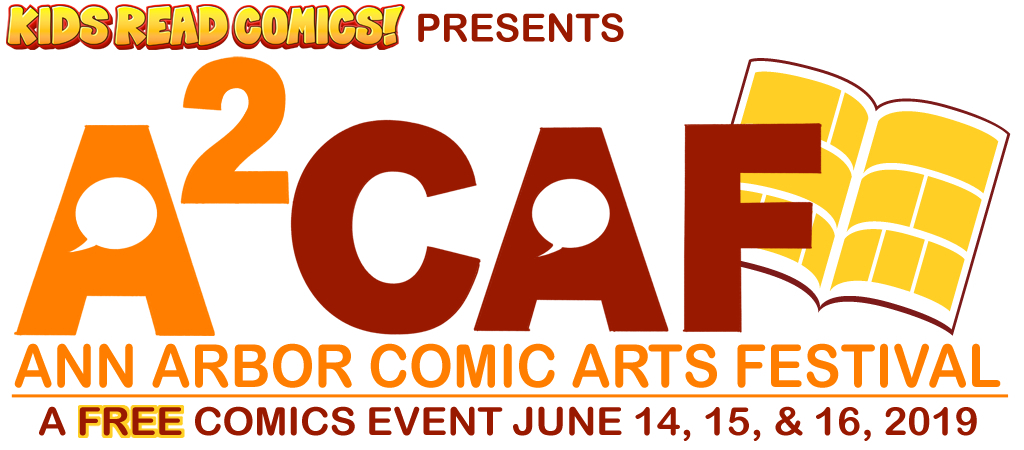
Michigan comics aren't just for kids. You're referring to
A2CAF (formerly Kids Read Comics), which has grown into quite a solid institution here. And if that show defines our community, then it does make it hard for folks who don't make kid-centric work to feel like we're part of the clique. To their credit, since they changed the name to A2CAF, I think they really are trying to expand the range of cartoonists they invite to exhibit. But is the audience really ready for Kam Komics'
Michigan Muthafukas or Jeff Manley's
Romancing the Strip or Carolyn Nowak's
No Better Words alongside Raina Telgemeier's latest release? Time will tell.
At CXC this year, I'll be leading a one-hour all-ages workshop on how to draw hands. It's a session I developed last year at my son's middle school. I led occasional drawing and cartooning classes there over the last few years, and finally realized all the kids really wanted to learn was to how-to-draw-hands, how-to-draw-eyes, how-to-draw-noses, etc. So last year I came up with a series of focused workshops like that, and I'm super excited to bring one of them to CXC this year! Wait, oh shit, I
am kid-centric, aren't I?
SPURGEON: Is there a homophone appropriate to comics conventions/selling comics/making comics?
WORDEN: There is if you stop by my table:
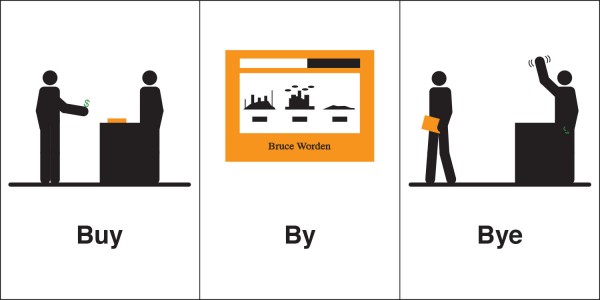 SPURGEON: What's the last good comic you read? What's the last
SPURGEON: What's the last good comic you read? What's the last great
one?
WORDEN: I'm going with a three-way tie for the last good comic I read: Ngozi Ukazu's first
Check, Please! book #Hockey which was the most fun book I read all summer. Jackson Ziegler's
Smell the Roses -- a short sci-fi comic that sucks you into its world completely and immediately. And Jim Benton's
Dog Butts and Love. And Stuff Like That. And Cats. -- a collection of his webcomics which are hilarious and super-poignant all at the same time.
The last
great one, though, has got to be
John Allison's Bad Machinery series.
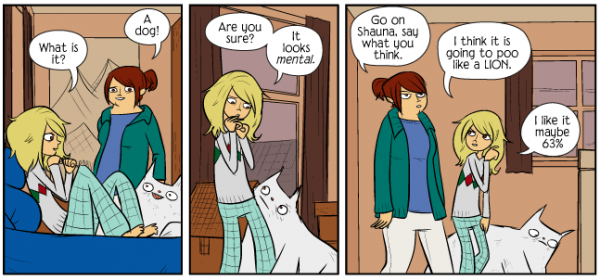 SPURGEON: That's a fine choice.
SPURGEON: That's a fine choice.
WORDEN: I discovered them a year or two ago, and have been re-reading them this summer. They're
so good, dude! Like, I don't know how he even does it. The stories are perfectly plotted, the dialogue is perfect, the jokes are perfect, the drawings I thought were weird and sparse but it turns out they're perfect too. And, I don't know, it seems like it's not even his main series! It's like a side-series in the same world as
Scary Go Round and
Giant Days, but focuses on the schoolkids. I just don't know how he does it. He's created a whole world, and found a voice that lets him do anything he wants in that world. And what he seems to want to do is write hilarious and heartfelt stories with rock-solid structure and believable characters. They're the best comics. The. Best.
*****
Homophones Visualized, Bruce Worden, Chronicle Books, 208 pages, hardcover, 9781452180038, August 2019, $14.95
*****
CR is a sponsor of
Cartoon Crossroads Columbus, September 26-29 2019. Bruce will be appearing at the expo's table #1 on the latter two day and providing us with a panel at the Expo on September 28. The show is free. Guests on hand this year range from Bruce to Hellen Jo to P. Craig Russell to Pidge Carlisle to Terry Moore. My thanks to a few CXC folks for helping facilitate this chat with Bruce. Hope to see you there. Come have fun with us.
*****
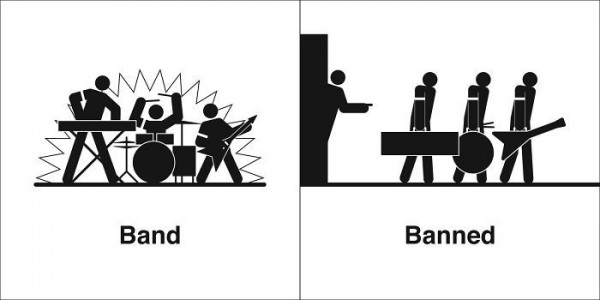
*****
*****
posted 8:00 pm PST |
Permalink
Daily Blog Archives
November 2019
October 2019
September 2019
August 2019
July 2019
Full Archives


